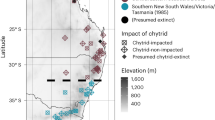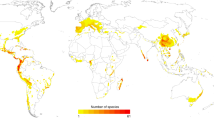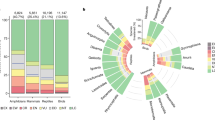Abstract
Alford et al.1 question the working model underlying our test2 for a link between global warming and amphibian disappearances, and Di Rosa et al.3 criticize our emphasis on a single proximate agent, the chytrid fungus Batrachochytrium dendrobatidis. Both teams report key pieces of the amphibian-decline puzzle and new evidence from different parts of the world that climate change is a factor in these losses. Here we show why our working model was appropriate and highlight the complexity of the imminent threat to species survival that results as global warming conspires with various other agents.
This is a preview of subscription content, access via your institution
Access options
Subscribe to this journal
Receive 51 print issues and online access
$199.00 per year
only $3.90 per issue
Buy this article
- Purchase on Springer Link
- Instant access to full article PDF
Prices may be subject to local taxes which are calculated during checkout

Similar content being viewed by others
References
Alford, R. A., Bradfield, K. S. & Richards, S. J. Nature 447, doi:10.1038/nature05940 (2007).
Pounds, J. A. et al. Nature 439, 161–167 (2006).
Di Rosa, I., Simoncelli, F., Fagotti, A. & Pascolini, R. Nature 447, doi:10.1038/ nature05941 (2007).
Ron, S. R., Duellman, W. E., Coloma, L. A. & Bustamante, M. J. Herpetol. 37, 116–126 (2003).
Lampo, M., Rodríquez-Contreras, A., La Marca, E. & Daszak, P. Herpetol. J. 16, 395–402 (2006).
García, I. J., Albornoz, R. & La Marca, E. Herpetotropicos 2, 64–72 (2007).
Merino-Viteri, A., Coloma, L. A. & Almendáriz, A. in Studies on the Andean Frogs of the Genera Telmatobius and Batrachophrynus (eds Lavilla, E. O. & De la Riva, I.) 9–37 (Asociación Herpetológica Española, Valencia, 2005).
Kiesecker, J. M., Blaustein, A. R. & Belden, L. K. Nature 410, 681–684 (2001).
Pounds, J. A. Nature 410, 639–640 (2001).
Pounds, J. A. & Puschendorf, R. Nature 427, 107–109 (2004).
Pounds, J. A., Fogden, M. P. L. & Campbell, J. H. Nature 398, 611–615 (1999).
Daszak, P. et al. Ecology 86, 3232–3237 (2005).
Bosch, J., Carrascal, L. M., Durán, L., Walker, S. & Fisher, M. C. Proc. R. Soc. B 274, 253–260 (2007).
Reading, C. J. Oecologia 151, 125–131 (2007).
Whitfield, S. M. et al. Proc. Natl Acad. Sci. USA 104, 8352–8356 (2007).
Author information
Authors and Affiliations
Rights and permissions
About this article
Cite this article
Pounds, J., Bustamante, M., Coloma, L. et al. Global warming and amphibian losses; The proximate cause of frog declines? (Reply). Nature 447, E5–E6 (2007). https://doi.org/10.1038/nature05942
Published:
Issue Date:
DOI: https://doi.org/10.1038/nature05942
This article is cited by
-
Beware the lone killer
Nature Climate Change (2008)
Comments
By submitting a comment you agree to abide by our Terms and Community Guidelines. If you find something abusive or that does not comply with our terms or guidelines please flag it as inappropriate.



